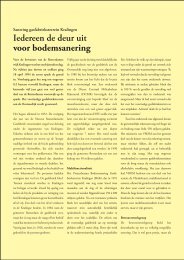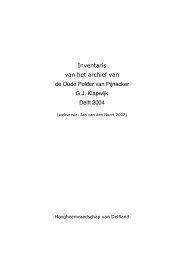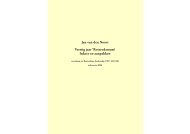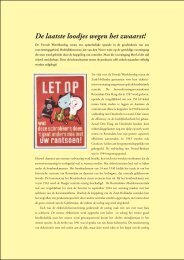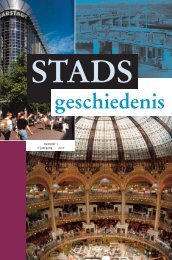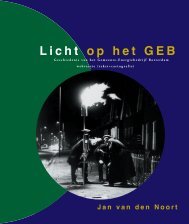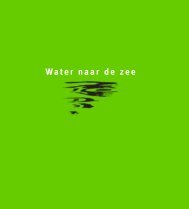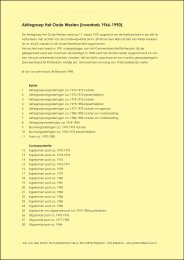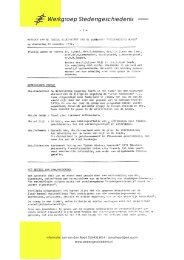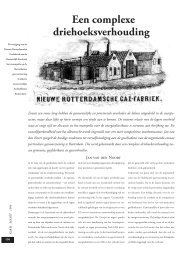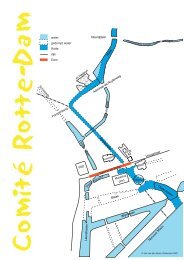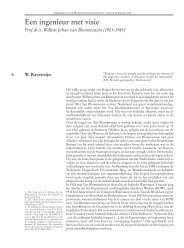Net Werk voor de Geschiedenis van Hygiene en Milieu, 1999-2001 ...
Net Werk voor de Geschiedenis van Hygiene en Milieu, 1999-2001 ...
Net Werk voor de Geschiedenis van Hygiene en Milieu, 1999-2001 ...
You also want an ePaper? Increase the reach of your titles
YUMPU automatically turns print PDFs into web optimized ePapers that Google loves.
10<br />
11<br />
Oproep<strong>en</strong><br />
The Book of Nature.<br />
Continuity and Change in European<br />
and American Attitu<strong>de</strong>s<br />
Towards the Natural World<br />
22 - 25 Mei 2002 Groning<strong>en</strong><br />
The metaphor of the ‘Book of Nature’<br />
is a recurr<strong>en</strong>t theme in the<br />
history of Western attitu<strong>de</strong>s towards<br />
the natural world. In this tradition,<br />
nature is se<strong>en</strong> as a text - a system of<br />
signs - that refers to and provi<strong>de</strong>s<br />
insights into the wisdom, provi<strong>de</strong>nce<br />
and omnipot<strong>en</strong>ce of God the<br />
Creator. Through the ages, however,<br />
smaller and greater changes have<br />
tak<strong>en</strong> place concerning the use of<br />
this concept. The confer<strong>en</strong>ce will<br />
explore this interplay of change and<br />
continuity, from Classical Antiquity<br />
to and beyond Darwin.<br />
Proposals for papers should be submitted<br />
to the confer<strong>en</strong>ce secretary<br />
at the following email-address:<br />
m.r.b.wubbolts@let.rug.nl. Please<br />
inclu<strong>de</strong> your name, affiliation, a<br />
title and a short summary (15-20<br />
lines).<br />
More information on the confer<strong>en</strong>ce<br />
can be gathered via the following<br />
website: http://odur.let.<br />
rug.nl/gscc/. Deadline: Proposals<br />
should reach the secretary before 1<br />
february 2002.<br />
Technology, Cultural<br />
Interchange and Globalization<br />
29th Symposium ICOHTEC<br />
The International Committee for<br />
the History of Technology<br />
June 22-26, 2002 in Granada<br />
ICOHTEC http://www.icohtec.<br />
org is an international scholarly<br />
organization associated with the<br />
International Union for the History<br />
and Philosophy of Sci<strong>en</strong>ce and<br />
UNESCO, and in addition to its<br />
annual symposium, publishes an<br />
annual journal ICON.<br />
The g<strong>en</strong>eral theme of the 29th<br />
Symposium is Technology, Cultural<br />
Interchange and Globalization, and<br />
it will have sessions on a number of<br />
themes.<br />
Other sessions are welcomed; please<br />
see the g<strong>en</strong>eral symposium announcem<strong>en</strong>t<br />
on H-<strong>Net</strong> Announce<br />
or at the ICOHTEC web site.)<br />
If you are interested in participating<br />
in the Technology and Environm<strong>en</strong>t<br />
session particularly, please<br />
email me. The overall session proposal<br />
must be completed by January<br />
15, 2002, so if you are interested<br />
in giving a paper, I will need<br />
a 500-word abstract and a one-page<br />
c.v., by email, not later than January<br />
1st. I’d prefer to have proposals<br />
by early December, if possible.<br />
Actual pres<strong>en</strong>tations at the symposium<br />
are about 20 minutes in l<strong>en</strong>gth<br />
plus lots of discussion. If you have<br />
a longer version of the paper, the<br />
10<br />
11<br />
69<br />
contactblad <strong>van</strong> <strong>de</strong><br />
stichting net werk <strong>voor</strong> <strong>de</strong><br />
1116-1117<br />
geschie<strong>de</strong>nis <strong>van</strong> hygiëne <strong>en</strong> milieu<br />
redactie: myriam d a r u<br />
webversie: jan <strong>van</strong> <strong>de</strong>n n o o r t<br />
11<br />
12<br />
editor of ICON urges participants<br />
to submit them for possible publication.<br />
James C. Williams Professor of History,<br />
Vice Presi<strong>de</strong>nt & 2002 Program<br />
Chairperson, International Committee<br />
for the History of Technology<br />
Office: History Departm<strong>en</strong>t<br />
De Anza College,<br />
Cupertino CA USA<br />
Mailing address:<br />
790 Raymundo Av<strong>en</strong>ue,<br />
Los Altos CA 94024-3138<br />
Phone: +1 650-960-8193<br />
Messages: +1 408-864-8964<br />
Email: Techjunc@pacbell.net<br />
Tra<strong>de</strong>, Merchant Capital and<br />
Welfare: Port Cities and Public<br />
Health, 16th - 20th C<strong>en</strong>turies<br />
Regular Session at the XIIIth International<br />
Economic History Congress,<br />
Bu<strong>en</strong>os Aires, 22 to 26 July 2002<br />
Port Cities have played a critical<br />
role in international <strong>de</strong>velopm<strong>en</strong>t<br />
and urbanization. Ev<strong>en</strong> in the<br />
pre-industrial period, marketing<br />
and tra<strong>de</strong> were important factors<br />
which affected the pattern<br />
of urban expansion or <strong>de</strong>cline,<br />
and ports, after capital cities,<br />
frequ<strong>en</strong>tly registered the greatest<br />
growth. Maritime commerce,<br />
therefore, was a powerful factor<br />
behind urbanization, and port<br />
cities served as the nexus of the<br />
growing world market.<br />
As a consequ<strong>en</strong>ce of this function,<br />
port cities were invariably prone<br />
to an increased risk of exposure,<br />
particularly to infectious diseases.<br />
Many of the dominant epi<strong>de</strong>mic<br />
diseases, such as plague, cholera,<br />
typhoid and yellow fever, were<br />
imported via port cities which, in<br />
turn, accelerated disease diffusion<br />
in coastal areas and <strong>de</strong>p<strong>en</strong><strong>de</strong>nt hinterlands.<br />
The individual <strong>de</strong>mographic regimes<br />
of large ports were moul<strong>de</strong>d<br />
by similar factors and ext<strong>en</strong>ding<br />
trading networks, together with<br />
high levels of in-migration, aggravated<br />
the lat<strong>en</strong>t exposure risks of<br />
the indig<strong>en</strong>ous population. At the<br />
same time, many ports were characterized<br />
by flexible labour markets,<br />
a strong reliance on casual work,<br />
ext<strong>en</strong>sive in-migration and a broad<br />
ethnic mix.<br />
Moreover, the dominance of merchant<br />
capital directly affected the<br />
contemporary response to public<br />
health issues and had a profound<br />
impact on the selection and implem<strong>en</strong>tation<br />
of specific strategies. On<br />
the one hand the need to confront<br />
health risks was initially appar<strong>en</strong>t in<br />
port cities, on the other hand there<br />
was an unusually high <strong>de</strong>p<strong>en</strong><strong>de</strong>ncy<br />
on charity and philanthropy, and a<br />
g<strong>en</strong>eral abs<strong>en</strong>ce of collective commitm<strong>en</strong>t<br />
to social welfare provision.<br />
Consi<strong>de</strong>rable work has be<strong>en</strong> un<strong>de</strong>rtak<strong>en</strong><br />
in the last few years to<br />
10/11<br />
<strong>Net</strong> <strong>Werk</strong> 69 - oktober <strong>2001</strong><br />
11/12



